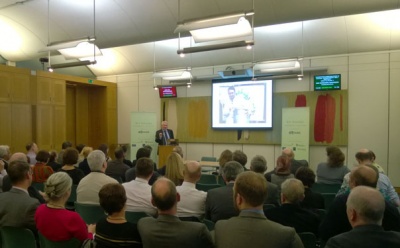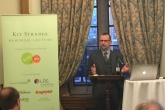Georgeson calls for united recycling lobbying
 Ray Georgeson, delivering the 2016 Kit Strange Memorial Lecture yesterday (26 January) called for more united lobbying by recycling industries and ‘an active and enabling state’ to improve the sector’s prospects.
Ray Georgeson, delivering the 2016 Kit Strange Memorial Lecture yesterday (26 January) called for more united lobbying by recycling industries and ‘an active and enabling state’ to improve the sector’s prospects.
Shared communication
Speaking at the Houses of Parliament, Georgeson highlighted the need for the industry to work together and ensure that its voices are heard: “There’s a huge challenge for all of us in how we communicate to the present government and those that follow about the value and importance of our sector. Undoubtedly, we need more coordination and more smart thinking about the number of voices active as representative and advocating bodies.
“Individual bodies all have a critical role to play, but we must do more to coordinate and present our shared messages where we really have them, because we’ve got good stories to tell – we need to tell them better, in a more united way.”
This is especially important, said Georgeson, with regards to the upcoming European referendum. He suggested that it is very important for the industry that the UK remains a part of the union and encouraged his colleagues to stay on the front foot and spread that message early.
He said: “If this industry believes that we should stay in Europe and make Europe better, we need to speak out, not be complacent and wait for somebody else to do it, but do it ourselves. Even if we do nothing more than talk to our own workforces, we would be in dereliction of our duties if we do not shape up and do that.
“Complacency will send the referendum in the direction of no, and we must avoid that at all costs.”
‘Appetite for improvement’
 With a focus on England, Georgeson, who is currently Chief Executive of the Resource Association and Director of Ray Georgeson Resources, presented a graph of rising dry and green recycling rates that stopped at 2010, noting that he couldn’t stand to include more recent years since “we all know what has happened since then”. Though he apportioned some blame to Eric Pickles for the government losing its “appetite for improvement”, he noted that there were other factors at play.
With a focus on England, Georgeson, who is currently Chief Executive of the Resource Association and Director of Ray Georgeson Resources, presented a graph of rising dry and green recycling rates that stopped at 2010, noting that he couldn’t stand to include more recent years since “we all know what has happened since then”. Though he apportioned some blame to Eric Pickles for the government losing its “appetite for improvement”, he noted that there were other factors at play.
He specifically highlighted the failure of government to do anything to save Closed Loop Recycling when the plastic recycler fell into difficulty last year with the drop in oil prices and the dairy industry backed out of voluntary commitments to use recycled material in its packaging. Georgeson bemoaned the loss of Closed Loop’s state of the art technology capable of delivering food-grade recycled HDPE, and the subsequent loss of paper reprocessing capacity at Aylesford, worrying that there could be more difficulty ahead.
He did point out, however, that the basket value of the key recyclable materials (if they're collected and sorted well), is on a consistent upward trend, suggesting the need to maintain and expand high-quality collections.
Georgeson said: “There’s a lot of talk about turbulence and volatility, and it’s true. But a lot of people are saying that the market is doomed. I’d like to hear more long-term perspective. And here is a longer-term perspective on the basket price of key materials. If they are collected well, sorted well and delivered to market well, they command decent prices and consistently command decent prices over a period of time.
“They don’t command decent prices when they’re badly sorted, in a badly run material recovery facility and sent out to goodness knows where because no one knows where the end destination is. And we wonder why that business model, which is close to failing, is causing such shockwaves.”
Concluding, he borrowed an expression from Lisa Nandy, MP for Wigan and Shadow Secretary of State for Energy and Climate Change, that “an active and enabling state” is required to bring about the right conditions for industry to flourish. He called for the government to at least overturn the law that currently actively prohibits pay-as-you-throw (PAYT) schemes in this country, saying: “It's worked in most of Europe – why not here?"
Kit Strange Memorial Lecture

Remembering Strange as “a reflector and a forward thinker”, Georgeson went on to present an “unashamedly personal” account of his time in the waste industry – from early experiences watching people create value from waste in Zambia to pioneering kerbside collection with Friends of the Earth and on to time with Waste Watch and the Waste & Resources Action Programme (WRAP).
Hot 100: waste wizards
The event also saw the announcement of Resource’s Hot 100 list. This year’s list was topped by chef and sustainability campaigner, Hugh Fearnley-Whittingstall, who was commended for his recent BBC series Hugh’s War on Waste.
The full list is available in the current issue of Resource magazine.









